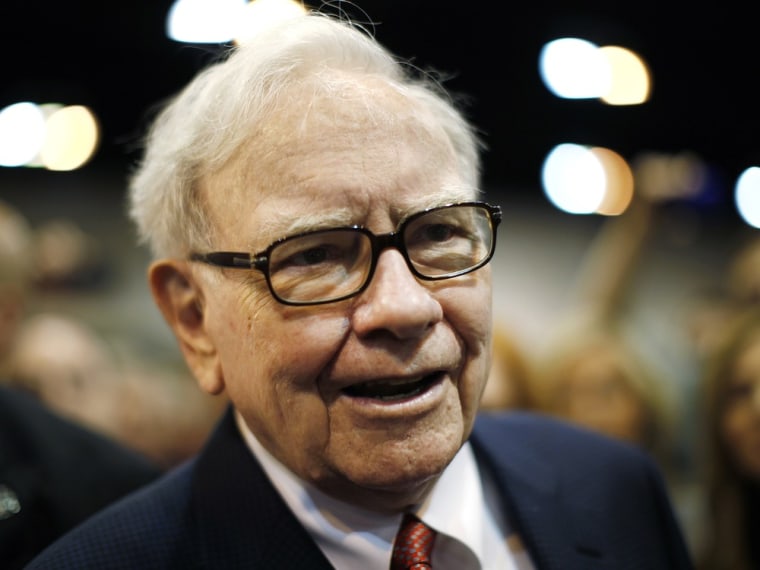Warren Buffett’s $5 billion cash infusion is a bet that investor fears about Bank of America’s financial strength have been overblown.
It’s also a wager the banking giant will be able with withstand ongoing mortgage losses. Fresh signs of further deterioration in the housing market, however, could make Buffett’s bet one of his riskiest.
Buffett's investment is a huge shot in the arm for the Charlotte, N.C.-based banking giant, which has seen its stock come under pressure amid questions about its balance sheet.
Buffett told CNBC he called BofA chief executive Brian Moynihan this week and offered to make the investment. Buffett’s billions helped calm recent investor fears that the bank may need to raise more capital — perhaps tens or hundreds of billions of dollars — to offset its mortgage losses.
Along with his check, the Oracle of Omaha delivered a ringing endorsement.
"Bank of America is a strong, well-led company, and I called Brian to tell him I wanted to invest in it," Buffett said in a statement posted on BofA's website.
The message was aimed at investors who have grown frustrated with the bank’s handling of its mortgage mess.
"Perhaps even more than the capital, the imprimatur of Buffett will build confidence in BofA,” said independent banking analyst Nancy Bush. "This investment will encourage other similar investors, who may have been staying away, to take a closer look."
Buffett won much more generous terms than a common shareholder: 50,000 shares of preferred stock that will pay a 6 percent annual dividend. He also got warrants to buy 700 million Bank of America shares at $7.14 a share. News of the deal sent the bank’s stock well above that price, rising 10 percent to $7.69 in afternoon trading, earning Buffett an instant paper profit of more than $350 million.
Bank of America’s common stock investors haven’t done as well. Over the past few weeks, ominous reports of a new slowdown in the economy triggered a wave of selling that erased more than a third of Bank of America’s market value.
Though Bank of America still faces big losses on its portfolio of troubled mortgages, buffett is betting the recent selling in the bank’s shares simply went too far. Shares are trading well below the company’s so-called “book value,” a widely watched benchmark that roughly tracks a company’s total assets minus its liabilities.
Bank of America has plenty of capital. It reported some $2.26 trillion in assets on its books as of the end of June. But investors have grown increasingly concerned because those assets include one of the industry’s largest and most troubled portfolio of home mortgages, which was part of its purchase of Countrywide Financial in January 2008.
For now, the additional $5 billion should help allay fears that Bank of America can’t raise more capital if it needs to.
"This proves to the market that if the bank needs additional capital — which we don't believe they do — but if they needed to calm the market by raising capital, they could do it within 30 minutes with a quick call to Uncle Warren,” said Sean Egan, managing director at Egan-Jones Ratings.
Buffett’s bet on the bank is also a bet that future mortgage losses are manageable. Those losses will depend heavily on how many more homeowners default on their loans and how much Bank of America can recover from the sale of their homes after it forecloses on the properties.
The outlook on that front darkened this week as the Mortgage Bankers Association reported that delinquency rates on mortgages rose in the second quarter after falling for a year.
"Mortgage delinquencies are no longer improving and are now showing some signs of worsening," said Jay Brinkmann, chief economist of the MBA, a trade group.
The rise in delinquencies stems in part from the persistently weak job market. With unemployment stuck at 9.1 percent, employers are not creating enough new positions to keep up with population growth.
While delinquencies are rising, the pace of new home seizures has dropped, slowed by legal challenges to alleged shoddy document handling. Banks are also limiting their inventories of unsold homes to avoid flooding the market with more distressed sales than they have to.
Even as the foreclosure pipeline has slowed, roughly a third of all homes sold in the second quarter were foreclosed properties, according to listing firm RealtyTrac. The sale of those properties, often in need of repair, represent heavy losses for lenders. Bank-owned houses sold for roughly 40 less than the average price of other homes in the second quarter, according to RealtyTrac. That discount is up from 36 percent in the first quarter and 34 percent from the same quarter one year ago.
Bank of America also faces unknown losses from a legal challenges on several fronts. Earlier this month, American International Group sued the bank for $10 billion, claiming its Merrill Lynch and Countrywide units misrepresented the quality of mortgages used to back bonds sold to investors. Bank of America is also trying to settle similar complaints with 22 other investors, including the Federal Reserve Bank of New York.
The bank is also one of several major financial institutions in settlement talks with state attorneys general over the questionable “robo-signing” process used to speed foreclosures.
